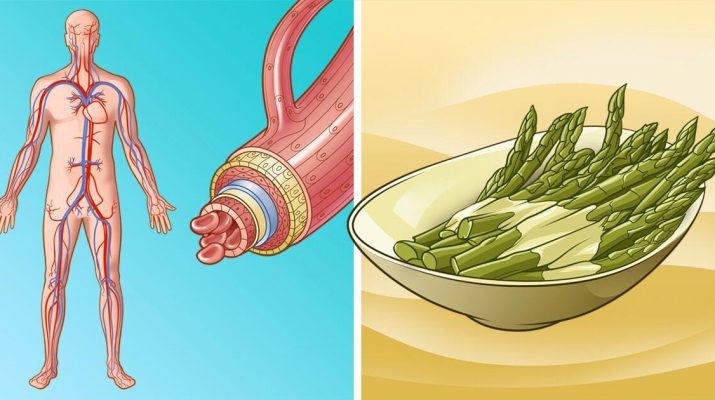Plaque buildup in the arteries can put you at serious risk for stroke and heart attack. Plaque can rupture, causing a heart attack, or it can get large enough to block blood flow.
According to an article on Harvard Health, it isn’t possible to get rid of plaque in the arteries, but we can shrink it. Doctors try to remedy the problem by finding small, soft plaques, removing the cholesterol from inside of them, and allowing them to shrivel, thereby reducing the blockage and danger of rupture. This can be accomplished with drugs called statins, but statins come with side effects that make some patients wary.
Statins can cause muscle pain, fuzzy thinking, digestive issues, and in some cases even liver damage. For this reason, dietary changes are a good first option for reducing cholesterol, shrinking arterial plaque, and helping to protect the heart from damage. Here are some foods to include in your diet.
1. Asparagus
Because asparagus is rich in vitamins and minerals, it helps to lower blood pressure, among other health benefits. A half cup of asparagus has 6% of the recommended daily allowance of potassium, which is know to help relax the blood vessels. This reduces the pressure on plaque, making it less likely to rupture.
2. Avocado
In a study published in the Journal of the American Heart Association, researches found that adding avocado to a heart healthy diet can help reduce “bad” LDL cholesterol. Avocado is another good source of potassium, like asparagus, which helps to reduce blood pressure.
3. Broccoli
Because it is rich in vitamin K, broccoli helps prevent calcium form damaging arteries. Broccoli is also fiber rich, which helps to lower blood pressure.
4. Spinach
Another potassium-rich food, spinach also is a good source of folate and fiber. Together these help to lower blood pressure as well as homocysteine levels. High homocysteine levels can damage the lining of the arteries and also makes the blood clot more easily than it should, which can result in blockages.
5. Whole grains
Whole grains are not only tasty, but they are excellent sources of soluble fiber. Soluble fiber binds itself to LDL cholesterol, allowing it to pass from the body instead of collecting in the arteries. Whole grains are also good sources of magnesium which helps regulate blood pressure by dilating blood vessels.
6. Turmeric
Turmeric is known for being a potent anti-inflammatory. This can reduce damage to arterial walls. This spice can also help balance homocysteine levels because it is a good source of vitamin B6.
7. Olive oil
Olive oil is an excellent source of the essential fatty acid called monounsaturated oleic acid, which has been found to help lowers LDL cholesterol. In fact, a study published by the American Academy of Neurology found that people who used olive oil regularly had a 41% lower risk for stroke than people who did not use olive oil.
8. Almonds
With a multitude of heart-healthy nutrients, almonds are a smart addition to your diet. They are rich in healthy fats, protein, and fiber. Almonds are also excellent sources of magnesium. These nutrients help lower blood pressure and aid in the prevention of plaque formation.
9. Fatty fish
Fatty fish, like salmon, mackerel, tuna, and herring, is a rich source of omega-3 fatty acids. Omega-3 fatty acids reduce inflammation and also may help raise “good” HDL cholesterol. An article from Cleveland Heart Lab also says that consuming omega-3 fatty acids is a natural way to lower blood pressure.
10. Orange juice
Researchers have found that drinking two glasses of orange juice a day can significantly reduce blood pressure. Flavonoids found in citrus fruit also help protect arterial walls from damage.

